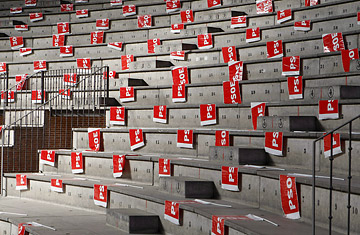
Socialist party flags lie on empty seats at a bullring outside Madrid, where the Socialist Party was planning to hold its closing electoral campaign event March 7, 2008.
Just two days before Spain's national election, terrorism forced its way back onto the political stage when a gunman killed former Socialist official Isaias Carrasco at midday near his home in the Basque town of Arrasate. As Carrasco's wife and daughter stood watching, a single gunman shot the former regional councilman several times from behind, then fled the scene with a waiting driver. Though no claim of responsibility has yet been made, a Spanish Interior Ministry spokesperson said the government was "certain" the attack had been carried out by the Basque separatist group ETA. Carrasco's murder would be the third committed by ETA since the organization officially declared an end to a cease-fire it called in March 2006.
Prime Minister Jose Luis Rodriguez Zapatero and Popular Party leader and election opponent Mariano Rajoy immediately suspended all campaign activities, and the Spanish parliament convened a special session late on Friday afternoon to express its unanimous condemnation of the assassination. Socialist spokesperson Diego Lopez Garrido confirmed that Sunday's election would be held as planned, assuring the press that "no matter how hard ETA tries," it will not impede "Spaniards' freedom of expression." Yet the question of whether — and how — the killing might affect the vote was on everyone's mind.
"We knew that this might happen," said Gorka Landaburu, editor of the journal Cambio 16 and himself a victim of a previous ETA bombing. "There had been threats, and ETA often attacks during elections." Indeed, Spanish Interior Minister Alfredo Perez Rubalcaba last month raised the country's security alert to its highest level, saying "We believe that ETA is going to try to kill before the elections." This afternoon he told a hastily convened press conference that ETA "will never intimidate Spain's society."
The opposition Popular Party has repeatedly attacked the governing Socialists for not doing enough to eradicate ETA. The conservative party initially lent its support to the 2006 peace process, but soon began criticizing the government's strategies. And after ETA broke the truce by blowing up a parking garage at Madrid's Barajas airport in December of 2006, killing two, the PP has sharply criticized Zapatero for continuing to "negotiate with terrorists" and lying about it to the Spanish people.
Yet after today's assassination, the Popular Party seems to have consciously decided to avoid blaming Zapatero's government. "Everyone knows what I think," said Mariano Rajoy. "The guilty ones are the assassins." Gustavo de Arístegui, the PP's chairperson for foreign affairs, concurred: "The only responsible parties are the terrorists themselves," he said, adding, "All democratic Spaniards are enemies of terrorism. There is only one path to crush terrorism, and that is the rule of law."
When asked whether the killing would affect the election, Arístegui was unequivocal: "Absolutely not." Juan Aviles, security expert at the Spain's National Distance University, agreed. "It's not going to influence the campaign. It's true that some could see it as evidence that Zapatero's strategy of negotiating with ETA was mistaken, but voters could also show solidarity with the [Socialist] victim."
The latest polls, conducted before the assassination, gave the Socialists a 4.1% lead over the Popular Party, and with voter turnout emerging as a key factor in these elections, the effect of today's killing is, in fact, hard to predict. Jose Ramon Montero, political scientist at Madrid's Autonomous University, believes the assassination "will certainly have an effect, but perhaps in a different direction than you might expect. Certainly there is a parallel with what happened in the last elections," he says, referring to the surprise ouster of the Popular Party government in the wake of the 2004 Madrid subway bombings. "But the fact that it was a Socialist former councilman who was killed could mobilize Socialist voters. It could bring out voters who otherwise would have stayed at home."
The assassination may also affect voting in the Basque Country, where the Socialists and the Basque Nationalist Party are competing for congressional seats. Supporters of the outlawed Batasuna (widely considered the political wing of ETA) and Basque Nationalist Action (ANV), which the government recently banned for its connections to Batasuna, have called for Basques to abstain from voting in an election they see as illegitimate. But according to Landaburu, the killing, if it was an attempt to enforce the boycott, might well backfire. "I wouldn't be surprised if people turn out en masse to vote not only in Spain, but in the Basque Country too. The only response to a group like this, a group that asks for abstention, is to vote."
